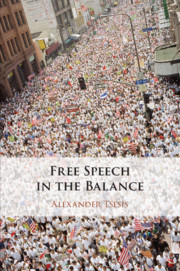Book contents
- Free Speech in the Balance
- Free Speech in the Balance
- Copyright page
- Dedication
- Contents
- Preface
- Acknowledgments
- Part I Theory
- Part II Application
- 5 US Formalism and EU Proportionality Alternative
- 6 Offense, Incitement, True Threats, and Hate Speech
- 7 Terrorist Incitement on the Internet
- 8 First Amendment on Campus
- 9 High Schooler Speech in the Age of the Internet
- 10 On the Campaign Trail
- Conclusion
- Notes
- Index
Conclusion
from Part II - Application
Published online by Cambridge University Press: 06 November 2020
- Free Speech in the Balance
- Free Speech in the Balance
- Copyright page
- Dedication
- Contents
- Preface
- Acknowledgments
- Part I Theory
- Part II Application
- 5 US Formalism and EU Proportionality Alternative
- 6 Offense, Incitement, True Threats, and Hate Speech
- 7 Terrorist Incitement on the Internet
- 8 First Amendment on Campus
- 9 High Schooler Speech in the Age of the Internet
- 10 On the Campaign Trail
- Conclusion
- Notes
- Index
Summary
Communication is neither simply an individual interest nor an associational right. Cases in the free speech area of law are a tangle of personal and group values. Each case, as Justice Brennan wrote in his opinion in a flag burning case, Texas v. Johnson, requires “careful consideration of the actual circumstances surrounding such expression.” 737 The reach of First Amendment protections is not defined through categories in existence when the nation ratified the Bill of Rights in 1791, but through proportional analyses of speech interests, countervailing government concerns, likelihood that the regulations will accomplish the stated policies, less restrictive regulatory alternatives, doctrines relevant to adjudication, and the aspirations of a free and equal people. Instead, the Roberts Court has relied on overly-simplified categories in decisions like Citizens United v. Federal Election Commission, McCutcheon v. Federal Election Commission, National Institute for Life Advocates v. Becerra, and United States v. Stevens rather than going through a complex analysis of all private and public values relevant to the resolution of conflicting legal claims. These judicial holdings are political in substance and limit legislative initiatives through cramped understandings of federalism, privacy, audiences, public health, and harm.
- Type
- Chapter
- Information
- Free Speech in the Balance , pp. 173 - 177Publisher: Cambridge University PressPrint publication year: 2020



